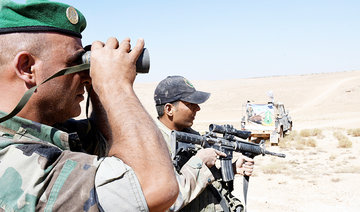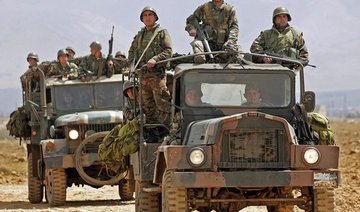BEIRUT: Lebanon held a day of national mourning on Friday in tribute to nine soldiers killed by Daesh terrorists three years ago. A tenth solider, recently killed in an ambush near the Lebanese-Syrian border, was also remembered at the ceremony.
The 10 soldiers honored on Friday were: Ibrahim Mgheit, Ali Masri, Mustafa Wehbe, Seif Zabyan, Mohammed Youssef, Khaled Hassan, Hussein Ammar, Ali Hajj Hassan, Abbas Medlej and Yehya Ali Khoder.
The ceremony was held at the Defense Ministry in Beirut. In tribute to the martyrs, serving soldiers repeated three times, “We will never forget you.”
The soldiers were awarded Lebanon’s highest posthumous medals by Lebanese President Michel Aoun. Their families were handed the Lebanese flag by Army Commander Gen. Joseph Aoun.
The farewell ceremony was attended by President Michel Aoun; Speaker of the Parliament Nabih Berri; Prime Minister Saad Hariri; a large number of valiant serving soldiers, representatives of the heads of communities, diplomats and families of the martyrs.
Interior Minister Nohad Al-Mashnouq was not present at the ceremony because the families of the deceased soldiers had accused him of “being behind their sons’ executions, when he stormed Roumieh prison, a year after the abduction of the soldiers, which provoked Daesh militants at the time.”
Addressing the soldiers’ families, President Michel Aoun said: “The blood of your sons was not shed in vain and the goals they died for will be attained and the truth will be unveiled.” He stressed the necessity of “national unity.”
“We will surely triumph over terrorism, and we are aware of the sleeping terrorist cells that will try to retaliate after their defeat; we will remain vigilant,” said Gen. Joseph Aoun in his speech.
“We are fully committed to all provisions of Resolution 1701 and we will cooperate with the UNIFIL to maintain the stability of the southern borders,” he added.
The convoy transporting the coffins of the Lebanese soldiers passed by the families’ tent in Riad Al-Solh Square where relatives of the soldiers have held a sit-in for the past three years. They had demanded to know the fate of their loved ones. Mourners threw rice and flowers at the procession as it passed on its way to the North, to Bekaa and Shouf regions.
“It is a moment of dignity,” said Hussein Youssef, father of soldier Mohammed, and unofficial spokesman for the soldiers’ families.
President Aoun later chaired the Higher Defense Council’s meeting at Baabda Presidential Palace where measures to be taken by the army to deploy troops on the eastern borders were discussed. The meeting also discussed proposals to improve logistics and military supplies as soon as possible.
The Council issued a statement urging “all security forces to remain vigilant in case of retaliatory operations which might destabilize the country.”
The Council delegated Foreign Minister Gebran Bassil to submit to the UN Security Council a list of Israeli violations, including the use of Lebanese airspace for direct strikes on Syria.
Lebanon holds day of national mourning for fallen soldiers
Lebanon holds day of national mourning for fallen soldiers

Israel strikes Yemen’s Sana’a airport, ports and power stations

- Houthis said that multiple air raids targeted an airport, military air base and a power station in Yemen
JERUSALEM: Israel’s military said it struck multiple targets linked to the Iran-aligned Houthi movement in Yemen on Thursday, including Sana’a International Airport and three ports along the western coast.
Attacks hit Yemen’s Hezyaz and Ras Kanatib power stations as well as military infrastructure in the ports of Hodeidah, Salif and Ras Kanatib, Israel’s military added.
The Houthis have repeatedly fired drones and missiles toward Israel in what they describe as acts of solidarity with Palestinians in Gaza.
The Israeli attacks on the airport, Hodeidah and on one power station, were reported by Al Masirah TV, the main television news outlet run by the Houthis.
More than a year of Houthi attacks have disrupted international shipping routes, forcing firms to re-route to longer and more expensive journeys that have in turn stoked fears over global inflation.
Israel has instructed its diplomatic missions in Europe to try to get the Houthis designated as a terrorist organization.
The UN Security Council is due to meet on Monday over Houthi attacks against Israel, Israel’s UN Ambassador Danny Danon said on Wednesday.
On Saturday, Israel’s military failed to intercept a missile from Yemen that fell in the Tel Aviv-Jaffa area, injuring 14 people.
Syria authorities say torched 1 million captagon pills

DAMASCUS: Syria’s new authorities torched a large stockpile of drugs on Wednesday, two security officials told AFP, including one million pills of captagon, whose industrial-scale production flourished under ousted president Bashar Assad.
Captagon is a banned amphetamine-like stimulant that became Syria’s largest export during the country’s more than 13-year civil war, effectively turning it into a narco state under Assad.
“We found a large quantity of captagon, around one million pills,” said a balaclava-wearing member of the security forces, who asked to be identified only by his first name, Osama, and whose khaki uniform bore a “public security” patch.
An AFP journalist saw forces pour fuel over and set fire to a cache of cannabis, the painkiller tramadol, and around 50 bags of pink and yellow captagon pills in a security compound formerly belonging to Assad’s forces in the capital’s Kafr Sousa district.
Captagon has flooded the black market across the region in recent years, with oil-rich Saudi Arabia a major destination.
“The security forces of the new government discovered a drug warehouse as they were inspecting the security quarter,” said another member of the security forces, who identified himself as Hamza.
Authorities destroyed the stocks of alcohol, cannabis, captagon and hashish in order to “protect Syrian society” and “cut off smuggling routes used by Assad family businesses,” he added.
Syria’s new Islamist rulers have yet to spell out their policy on alcohol, which has long been widely available in the country.
Since an Islamist-led rebel alliance toppled Assad on December 8 after a lightning offensive, Syria’s new authorities have said massive quantities of captagon have been found in former government sites around the country, including security branches.
AFP journalists in Syria have seen fighters from Islamist group Hayat Tahrir Al-Sham (HTS) set fire to what they said were stashes of captagon found at facilities once operated by Assad’s forces.
Security force member Hamza confirmed Wednesday that “this is not the first initiative of its kind — the security services, in a number of locations, have found other warehouses... and drug manufacturing sites and destroyed them in the appropriate manner.”
Maher Assad, a military commander and the brother of Bashar Assad, is widely accused of being the power behind the lucrative captagon trade.
Experts believe Syria’s former leader used the threat of drug-fueled unrest to put pressure on Arab governments.
A Saudi delegation met Syria’s new leader Ahmed Al-Sharaa in Damascus on Sunday, a source close to the government told AFP, to discuss the “Syria situation and captagon.”
Jordan in recent years has also cracked down on the smuggling of weapons and drugs including captagon along its 375-kilometer (230-mile) border with Syria.
Jordan says 18,000 Syrians returned home since Assad’s fall

AMMAN: About 18,000 Syrians have crossed into their country from Jordan since the government of Bashar Assad was toppled earlier this month, Jordanian authorities said on Thursday.
Interior Minister Mazen Al-Faraya told state TV channel Al-Mamlaka that “around 18,000 Syrians have returned to their country between the fall of the regime of Bashar Assad on December 8, 2024 until Thursday.”
He said the returnees included 2,300 refugees registered with the United Nations.
Amman says it has hosted about 1.3 million Syrians who fled their country since civil war broke out in 2011, with 650,000 formally registered with the United Nations.
Lebanon hopes for neighborly relations in first message to new Syria government

- Lebanon’s Iran-backed Hezbollah played a major part propping up Syria’s ousted President Bashar Assad through years of war
- Syria’s new Islamist de-facto leader Ahmed Al-Sharaa is seeking to establish relations with Arab and Western leaders
DUBAI: Lebanon said on Thursday it was looking forward to having the best neighborly relations with Syria, in its first official message to the new administration in Damascus.
Lebanese Foreign Minister Abdallah Bou Habib passed the message to his Syrian counterpart, Asaad Hassan Al-Shibani, in a phone call, the Lebanese Foreign Ministry said on X.
Lebanon’s Iran-backed Hezbollah played a major part propping up Syria’s ousted President Bashar Assad through years of war, before bringing its fighters back to Lebanon over the last year to fight in a bruising war with Israel – a redeployment which weakened Syrian government lines.
Under Assad, Hezbollah used Syria to bring in weapons and other military equipment from Iran, through Iraq and Syria and into Lebanon. But on Dec. 6, anti-Assad fighters seized the border with Iraq and cut off that route, and two days later, Islamist militants captured the capital Damascus.
Syria’s new Islamist de-facto leader Ahmed Al-Sharaa is seeking to establish relations with Arab and Western leaders after toppling Assad.
Iraqi intelligence chief discusses border security with new Syrian administration

BAGHDAD: An Iraqi delegation met with Syria’s new rulers in Damascus on Thursday, an Iraqi government spokesman said, the latest diplomatic outreach more than two weeks after the fall of Bashar Assad’s rule.
The delegation, led by Iraqi intelligence chief Hamid Al-Shatri, “met with the new Syrian administration,” government spokesman Bassem Al-Awadi told state media, adding that the parties discussed “the developments in the Syrian arena, and security and stability needs on the two countries’ shared border.”
















